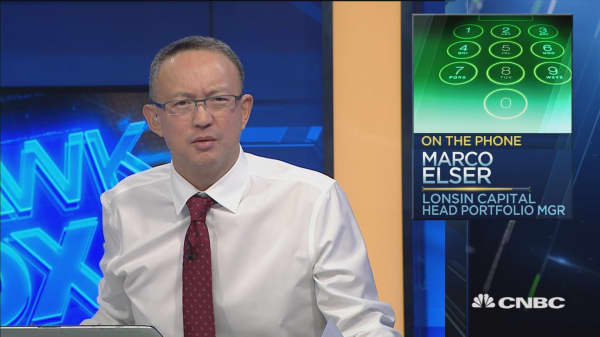Nearly a decade after a protracted Greek debt crisis spooked global markets, a fresh round of political turmoil in Italy has revived fears about the fate of the European financial system and its common currency.
This time, the numbers are a lot bigger.
"Italy's economy is 10 times larger than that of Greece, whose debt crisis shook the euro area's foundations," wrote Desmond Lachman, a resident fellow at the American Enterprise Institute, in a recent blog post. "The single currency is unlikely to survive in its present form if Italy were forced to exit that monetary arrangement."
Italy's economy has been struggling since the Great Recession years with a debt load that rivals the heavy Greek borrowing that forced massive cuts in public services there and drove Greece into a deep recession. That Italian debt crisis has become central to the ongoing political instability, as multiple governments have failed to resolve it.
The latest political crisis was sparked over the weekend, after interim Prime Minister Carlo Cottarelli failed to win enough support from major political parties for even a stop-gap government. The country has been trying to form a new government since March; the latest deadlock could force President Sergio Mattarella back to parliament in the coming days and send Italians back to the polls as early as July 29.
Italy's central bank warned on Tuesday the nation was only "a few short steps" from losing investors' confidence, as financial markets suffered the biggest sell-off in years on fears that new elections could become a proxy vote on Italian membership in the euro.
Backlash over the idea of a unified Europe comes as European Union and United Kingdom leaders have yet to resolve the terms of the U.K.'s departure from the bloc, after British voters last year approved the so-called Brexit referendum. A similar move by Italy would strike a potentially fatal blow to the 25-year-old political and economic union.
The political stalemate in Italy intensified after a March national election which saw heavy turnout for two populist parties: the anti-establishment 5-Star Movement and the anti-euro League party.
Some political analysts believe that the latest deadlock over the weekend could strengthen those parties' positions, raising further doubts about Italy's continued membership in the EU and use of the common currency.
"Italy will be wrapped in a long drawn-out period of wrangling that will feature intense anti-establishment and euroskeptic tones," political analyst Wolfango Piccoli told the Associated Press.
Even if the populist parties stop short of a clear call for exiting the euro, their strength has widened the political gap with EU officials in Brussels.
In an echo of the Greek debt crisis, the latest turmoil has reopened a political rift between Germany and the "peripheral" economies of Greece, Italy and Spain. That political divide will further complicate ongoing efforts to resolve Italy's crushing debt burden.
On Tuesday, EU officials promised to respect Italian voters' right to choose their own government, after Germany's European commissioner said Italians should not vote for the populists.
"My worry, my expectation, is that the coming weeks will show that the markets, government bonds, Italy's economy, could be so badly hit that these could send a signal to voters not to elect populists from the left or right," Guenther Oettinger, a German commissioner who oversees the EU budget committee, said in a German television interview.
The comments fueled an anti-Brussels and anti-German reaction in Italy, which could generate even stronger support for the populists in the upcoming election.
In the U.S., President Donald Trump hasn't commented on the crisis. But some observers say his administration's recent move to impose steep tariffs on European aluminum and steel will only make matters worse.
"The last thing Italy needs is a heightening of US-Europe trade tensions that could deal a heavy blow to the European economy," write the AEI's Lachman. "Yet this is precisely the direction in which the Trump administration appears to be heading."
— Reuters and the Associated Press contributed to this report.






